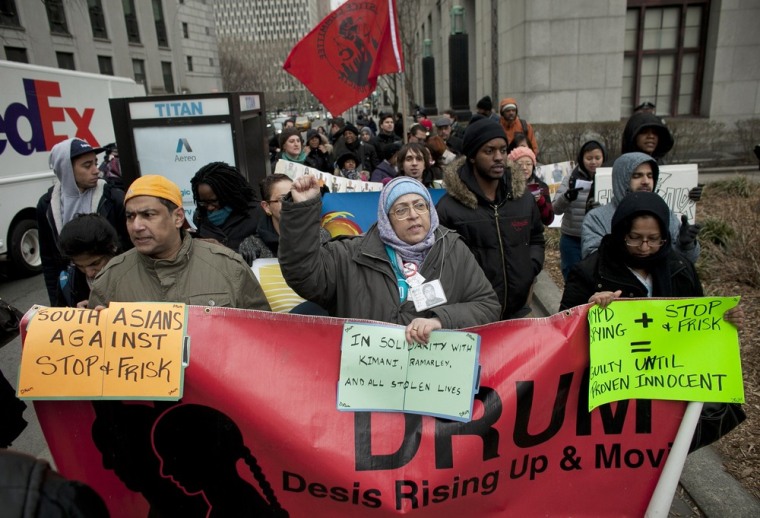A federal trial is pulling back the veil on the New York City Police Department's use of the controversial stop-and-frisk tactic.
The nonjury trial, which begins its second week Wednesday, involves a lawsuit from four men who argue the NYPD stops a disproportionate number of black and Hispanic men without cause. The suit seeks to reform stop-and-frisk, which is legal under a 1968 Supreme Court decision.
The NYPD has made about 5 million stops in the past 10 years, and most of them have involved young black and Hispanic men, according to The Associated Press. Only about 10 percent were arrested, with many of the rest left feeling wronged and humiliated. The four plaintiffs contend they were only targeted because of their race.
New York City Mayor Michael Bloomberg and NYPD Commissioner Raymond Kelly have hailed stop-and-frisk as a lifesaver and crime deterrent.
At the heart of the trial is a secretly recorded phone conversation between NYPD officer Pedro Serrano and his supervisor that questions who are the "right people" to stop on the streets, according to The Associated Press. Serrano said he decided to use his phone to record his boss because his supervisors believed he had tallied too few arrests, summonses, and stop, question and frisk reports, known as "250s".
"So, who are the right people?" asks Serrano.
"Depends where you are," answers Deputy Inspector Christopher McCormack.
"So you're saying what? Summons everybody for whatever reason?" Serrano asks.
"No, see, listen to me. Understand this. All right? I don't summons people for any reason, all right," McCormack responds. "We go out there and we summons people and we '250' people, the right people, at the right time, the right location."
"The right people, at the right time, the location" is a thinly-veiled way of mandating officers to stop minorities, lawyers for the four men who have sued police argue.
McCormack, the supervisor, is expected to testify later in the trial, according to The AP.
Officers deny racial profiling
At least three police officers have testified in pretrial testimony and will be called to testify in trial, according to The New York Times. All three, who are officers in Brooklyn precincts, denied engaging in racial profiling.
“We can’t just stop anyone for the sake of stopping a person,” Officer Edgar Gonzalez said, reported The Times.
The officers said they were conducting about 10 street stops a week, making them “three of the four N.Y.P.D. officers who recorded the highest number of stop, question and frisk encounters,” according to legal papers, The Times said.
“If someone is in the middle of a dark street, staring into the car and then when we drive by, they start ripping up garbage bags,” another one of the officers, Michael Noboa, said.
“That would give me reasonable suspicion to conduct a stop, question” and maybe frisk, he said, reported The Times.
Since the trial began last Monday, various men have testified that they were stopped and frisked by officers while doing mundane tasks such as getting milk from a grocery store or going to a party, reported The AP. They said they weren't doing anything wrong, and felt victimized.
Among them was 18-year-old Nicholas Peart, who said officers swarmed him with their weapons out, and told him and his two relatives to get down on the ground on the night of his 18th birthday. Officers were looking for robbery suspects who they thought resembled Peart and his relatives, The AP reported. Peart didn't think police had enough reason to stop him.
The Associated Press contributed to this report.
